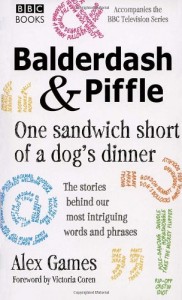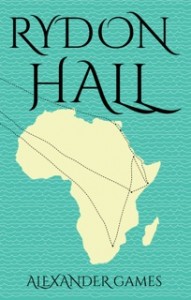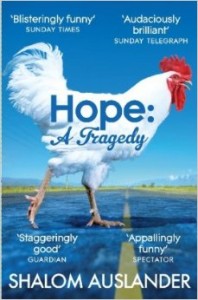Author Interview: Alexander Games
On creating flawed but driven characters and trying to set them on the right path
Alexander Games went to school in Hampstead, north-west London. He read Classics at Cambridge, a subject he would return to when getting his first ‘serious’ job, teaching Latin in a prep school in south-west London.
After university, he worked on Auberon Waugh’s Literary Review magazine, then moved to Spain for a year, where he claims to have learned “enough Spanish to wish he could speak it better”. On his return, he joined the Evening Standard as a feature writer and comedy critic but says he came to loathe the idea of judging other people’s attempts to be funny, so in the year 2000 he turned the tables on himself by performing over fifty gigs as a stand-up comedian. He enjoyed the experience and so, it seemed, did his audiences. “At least,” he says, “they seemed to be genuinely happy as I left the stage.”
Having written features, reviews and interviews for travel magazines and most of the country’s broadsheets, he then began work on a double biography of his comic heroes, Peter Cook and Dudley Moore, under the title Pete & Dud. After what he modestly descries as a ‘cuttings-based biography’ of Alan Bennett, he edited a monster best-seller, The Essential Spike Milligan, the first anthology of the great man’s writings to be published after his death. He then wrote Balderdash and Piffle (briefly no. 1 on Amazon UK), a BBC series/book about language but he was still searching for a steady income and a good idea for a novel. Then he discovered teaching, and found both. He is still teaching Classics, though now at more than one secondary school. And he hopes to be writing again, soon.

Q: Alex, welcome to my blog. Some readers have praised Rydon Hall as pure, escapist farce; others as a darkly comic meditation on vacuous celebrity. So which is it?
I side squarely with the latter while welcoming either interpretation or shades between.
Q: At what point during the writing of Rydon Hall did you come up with its title?
When my friends found out that I was working at a boys’ prep school, they mockingly said, ‘Are you going to rewrite Decline and Fall?’ I laughed at first, but as the atmosphere of this eccentric school seeped into me, I realised that that was exactly what I wanted to do: hence the echo, through assonance, between the two book titles.
Q: In which ways was writing the book transformative for you?
I started this book in the summer of 2009. I returned to it every half-term and end-of-term holiday after that until 2013. Almost from the start, I felt that the drama of a school party returning from a trip abroad minus one boy was a potential gold mine. Very soon, I was living more in the book than in the real world. My only thoughts were how to finish it, then how to publish it, and finally how it would be received, in school or beyond. It completely overtook me, indeed I can only with difficulty concentrate on reading someone else’s novel even now. Finishing the book is one of my greatest achievements. Had it gone on to be the international success which I think it deserved to be, I’m sure I would have been content to remain a teacher who wrote during the holidays. I still, perforce, am.
Q: What was your first recognition/success as an author?
My first published book was a double biography of two men called Peter Cook and Dudley Moore. A long time ago they were one of the best loved double acts in British comedy. Later, chiefly under Cook’s instigation, they launched their fearsome and execrable alter egos, Derek and Clive, whom I loved even more. Peter Cook was once voted Funniest Man Who Ever Lived, by a committee of comedy professionals. That, though, was a long time ago, and most young people, I find, have never heard of either of them.
Q: Where do you get your inspiration from?
I am drawn to comedies about flawed but driven men, who know that they are missing out somewhere but have no idea how to get back on the right track. There is a little of me in every character, of course, but I needed Charles’ essential helplessness, and I drew a lot of energy from his interaction with secondary but more colourful characters. The helplessness, frustration and panic are, of course, all drawn from inside me.
Q: How did you arrive at the decision to switch backwards and forwards between different time-lines?
Good question. The first draft was much more linear, but a trusted friend persuaded me of the beneficial effect of a ‘hook’, a trick I should have recognised from my newspaper days. For a long time I thought it was a plot-spoiler, but eventually I yielded. Now I feel like a dog, burying its favourite bone in the garden. When the time comes to dig it up, it tastes even better.
Q: Is there a phrase or quote about writing that you particularly like?
‘It’s not the writing that counts: it’s the rewriting.’ (Anon.) Certainly true of me: my second draft is almost invariably better than the first.
Q: Will Self believes that the serious literary novel is dead. Do you agree?
I had lunch with Will Self once, so that I could ask him about Peter Cook, and I very stupidly asked him if he (Will) missed being able to use that element of timing which live performers such as Cook could exploit. ‘Not at all,’ he said. (He was still writing novels at the time.) ‘Novels are all about timing.’ And of course he was right, as I came to realise more and more during the writing of Rydon Hall. Timing is part of the fun of writing a sustained piece of prose.
Q: What were the key factors that influenced your decision to become an indie author?
I have an agent, but he read an early (too early) draft and declared against it. Besides, he only likes it when I write non-fiction. Other agents enjoyed my writing (which they usually do) but concluded that they couldn’t see where to sell the current work (which they always say). I felt otherwise. In fact, I am of the opinion that anyone who doesn’t recognise the literary genius of Rydon Hall is a moron, with no intellectual spark or sense of what is happening in the world. So I asked a friend who had published his own novel. Easy, he said, and passed me a list of independent publishers. Heddon Publishing jumped out at me and the rest, as they say, is a footnote to a footnote in an obscure work about publishing history.

Click here to buy paperback
Click here to buy e-Book
Q: You have experience of both traditional and independent publishing. How do the two compare?
I am not just older but more old school than my publisher Katharine Smith. For example, I think of a ‘book’ as a thing with a front and back cover, and printed pages in between. Laughably out-of-date, I know, yet that was the world in which I grew up, and in which my dreams of authorship flourished. I happen to set more stock by print reviews, although I’ve enormously enjoyed the 5-star reviews which Rydon Hall has earned. But I suppose the main difference between us is that my publisher has not yet climbed into bed with the major book distributors like Bertrams or Gardners. I regret only being available through Amazon (which I fundamentally distrust, or resent) and would like to see a spray of Rydon Halls colouring the window of my local bookshop, or indeed any bookshop in London, Britain, Europe or either of our planet’s two hemispheres.
When I was writing my first book, the Head of Publicity took me to lunch in a modest Soho restaurant, and towards the end of the meal I said, ‘So what’s happening with the launch party?’ She looked a bit embarrassed and said, ‘Well, actually, this is it.’ For the launch of Rydon Hall, a very generous friend enabled me – I’m not sure how and I don’t dare ask – to hold the party in the offices of Working Title Films in London. I supplied booze and crisps, and crowbarred my children and a few of their friends into being drinks waiters. I made the speech I wanted to make without bursting into tears and thanking all my family. I didn’t get drunk until most of the people had left, and felt very happy for several days afterwards. It was one of the best evenings of my life. So there, world of publishing: I got my launch party in the end, even if I had to pay for it myself.
Q: Is there anything specific that you feel indie authors may miss out on?
When you’re working with people who are paid by Headline, Cape or the BBC Books publicity department to set up your TV or radio interview schedule, you do get the sense that a large industrial complex wants to get its money’s worth out of you, which is kind of comforting. Then again, the great thing about Print-on-Demand is that whenever I want to make changes to the text or front pages (which I have done), I can: simple!

Q: Do you feel there is more of a sense of community within independent publishing than there is with traditional publishing?
I don’t know about community, but I have enjoyed being able to exchange messages on a near-daily basis with Katharine Smith of Heddon Publishing. She seemed to feel almost exactly the same way about the book as I did, right from the start, and we have had a very positive and productive friendship. I would recommend her to anyone.
Q: At the beginning of 2013, Smashword’s Mark Coker predicted that ‘Global’ would be the year’s biggest story. Do you have a readership in a country other than your own?
I seem to specialise in writing books (e.g., a biography of Alan Bennett) that are only appreciated, let alone published, or read, in the UK – if at all.
Q: Do have any particular favourite genres of fiction?
I am troubled by this one, because this novel, unlike its non-fiction predecessors, is fuelled with the compulsion to make the reader laugh. I have really, really enjoyed readers telling me that they laughed out loud on trains or buses: that is exactly the sort of reaction I am aiming at, for most of the book, and it makes the effort worthwhile. The trouble is – deep breath – in a confusing way, I really don’t like novels that are written by ‘gag’ writers, and which set out to make the reader laugh. I hate reading a paragraph which has a great grin on its face, and which is obviously attempting to make me laugh. I prefer the laughter to sneak up to me than to stand there with a giant poster saying ‘The Next Paragraph Is Really Funny’. My friend, the novelist, Andrew Martin, put it very well. ‘It’s not about writing jokes,’ he said, with a rictus of contempt. ‘It’s about tone.’ That’s it.
Q: Are there any books that you would describe as ‘life-changing’?
I had forgotten how much pleasure I could get from Dickens until I read David Copperfield a few years ago. I wanted to stop and hug it every few paragraphs, the characters were so richly drawn. For me it defined the experience of being British in much the same way, I imagine, as Hope: A Tragedy by Shalom Auslander (2012) defined the American, or American/Jewish experience for people of a certain age. I admit I laughed until I could feel tears in my eyes, especially early on when the set-up was still fresh.

Thank you again for taking part in this blog interview. I’m very grateful that you took time out to answer these questions and wish you all the best with your future projects.
Pleasure: I enjoyed it.
Rydon Hall by Alexander Games is available, in print or on kindle, on Amazon. It is published by Heddon Publishing. Read more about Alexander on Heddon Publishing’s website or stay in touch with Heddon Publishing on Facebook


